
Business Litigation Lawyer Washington, D.C.
If you have any kinds of legal concerns about your business—especially if those concerns relate to an ongoing or newly arising business dispute—it is important to connect with our experienced Washington, D.C. business litigation lawyer as proactively as you can. All too often, business owners wait until they either need to file litigation or have been named as a defendant in a litigation-related matter to seek legal counsel. If you find yourself in this position, reach out the experienced Maryland legal team at Eric Siegel Law immediately. But, even if you have not yet reached this legal turning point, it is important to connect with our firm as soon as you can. Why? By being proactive, you may be able to halt the need for litigation before it begins in earnest. Conversely, if litigation is necessary, you’ll provide our team with as much time as possible to build a strong case on behalf of your business.
Table of Contents
- Tort Claims
- Breach of Contract Cases
- Types of Alternative Dispute Resolution
- Washington Business Litigation Infographic
- Washington Business Litigation Statistics
- Washington Business Litigation FAQs
- Washington Business Litigation Glossary
- Eric Siegel Law, Washington Business Litigation Lawyer
- Contact Our Washington Business Litigation Lawyer Today
Tort Claims
A tort claim is a legal case where a person alleges that they have suffered harm or loss due to the wrongful actions of another. This type of legal action falls under the broader umbrella of civil law, which addresses disputes between individuals or entities. Unlike criminal cases, which involve the state against an individual for breaking the law, tort cases revolve around private disputes where one party seeks compensation from another for the damages caused.
Establishing Negligence
Negligence is the cornerstone of tort law and is arguably the most prevalent form of tort. This type of tort occurs when someone fails to exercise the level of care that a reasonably prudent person would under similar circumstances. The key elements of a negligence claim include:
- Duty of Care: The defendant had a legal obligation to act with care toward the plaintiff.
- Breach of Duty: The defendant failed to fulfill this duty through action or inaction.
- Causation: The defendant’s breach of duty directly caused the harm or loss to the plaintiff.
- Damages: The plaintiff suffered actual harm or loss as a result.
Examples of negligence include car accidents due to reckless driving, medical malpractice, or slip and fall accidents on unsafe premises.
Intentional Torts
Intentional torts differ from negligence in that they involve deliberate actions rather than carelessness. In these cases, the defendant’s intent to cause harm or certain outcomes is a critical factor. Common types of intentional torts include:
- Assault and Battery: Intentional acts that create a fear of imminent harm or involve unwanted physical contact.
- Defamation (Libel and Slander): Making false statements that harm another’s reputation.
- False Imprisonment: Unlawfully restricting another’s freedom of movement.
- Trespass: Unauthorized entry into someone’s property.
- Fraud: Intentionally deceiving another to cause harm or gain an advantage.
These acts are often seen as more egregious due to their deliberate nature, which can influence the damages awarded.
Strict Liability Torts
Strict liability is a unique category of tort law where the defendant can be held liable regardless of negligence or intent. The focus here is on the activity or product that caused the harm, not the conduct of the defendant. Key areas include:
- Product Liability: Manufacturers or sellers are held liable for defective products that cause injury or harm. This applies even if they exercised care in product design and manufacturing.
- Abnormally Dangerous Activities: Involvement in inherently hazardous activities, like the use of explosives or keeping wild animals, can lead to strict liability if they cause harm.
The rationale behind strict liability is that some activities or products pose enough risk that those engaging in them should be responsible for any resulting harm, irrespective of how careful they were.
Breach of Contract Cases
If you have a vendor, customer or partner that has breached a contract, consult a business litigation lawyer in Washington, D.C. Breach of contract cases are the most frequently disputed cases for law firms such as Eric Siegel Law. These cases may include disputes in goods delivered, pay for a service or raw material or receipt of damaged goods. Whether you wrote out a contract that detailed every part of your deal or you have a verbal agreement, your case can be litigated if one party experienced a financial loss due to the breach. If you have suffered, you can file a breach of contract lawsuit with your attorney.
- You probably need a business litigation attorney when a contract you’re a party to is breached. Breach of contract disputes are the most common reason for working with a business litigation attorney in Washington DC.
- There are different kinds of law typically involved in business litigation. They are breach of contract, intellectual property, ownership disputes, and labor disputes.
- Breach of contract is the most common. It simply means that someone who is party to a contract has violated its terms. Often this ends up in court and having the right business litigation attorney can make all the difference.
- When you’re involved in intellectual property you may need a business litigation attorney. If you or your business develops software or other intellectual property like music, writing, art, etc. and another company uses it without permission or a license to use it, you need a business litigation attorney like Eric Siegel Law in Washington D.C
- If you become involved in an ownership dispute, you are likely to benefit from working with a business litigation lawyer. Such a need might arise in a disagreement between co-owners over who owns how much or what part of a company other kinds of ownership disputes.
- Labor law disputes in Washington DC include such issues as gender and race discrimination, failure to adhere to a non-compete agreement, cases where a former owner is making additional claims and disputes between employees and the company over benefits and other issues.
For Intellectual Property Claims
If you own the rights to intellectual property, you choose who uses that property. For example, if you have developed valuable software to use in your company, you can choose to lease or sell licenses to other companies, but if a company begins using your software without your permission, you have an intellectual property claim. Intellectual property claims include copyright infringement, trade secret abuses, or damage to intellectual property. For example, you cannot steal another company’s logo, business processes or customer list. If you have been a victim of these disputes, you should seek the help of a business litigation lawyer in Washington, D.C.
In the Case of Ownership Disputes
If you aren’t a sole proprietor, you may have a dispute with your business co-owners at some point. For example, you may have a disagreement with your shareholders, business partner and even your board of directors. These disputes often revolve around how the business is being managed. However, you typically have contracts with your fellow business owners. Therefore, you do have legal recourse if you are operating according to the contract terms. A business litigation lawyer in Washington, D.C., e.g., Eric Siegel Law, can help you sort out the contract terms and mediate the disagreement, and if a resolution cannot be negotiated, this attorney can also litigate the case in court.
During Labor Disputes
Labor disputes are complicated. These disputes may arise from current or former employers who are trying to make a claim against the business. These disputes may include an employer’s unwillingness to fulfill employment contract terms, such as benefits. They may also start with an employer who is trying to ensure that its rights are upheld by an employee. For example, a former employee may have violated a noncompete clause. Discrimination claims also fall under labor disputes. In these cases, you should seek the help of a business litigation lawyer in Washington, D.C.
Types of Alternative Dispute Resolution
As a Washington, D.C. business litigation lawyer can explain, alternative dispute resolution provides a fast resolution to disputes, cost savings for both parties, allows the preservation of business relationships, protects confidential information, and allows for more creative solutions to complex issues.
Choosing to use the legal system to solve your business contract dispute will generate a winner and loser, and judgments rendered by the legal system may not solve the problem and are usually inflexible. If you decided to pursue litigation, many of these benefits of alternative dispute resolution will not be realized and you will destroy business relationships as well as expose your proprietary information to misappropriation.
Disputes are costly, no matter which avenue you choose to travel when resolving yours. Alternative dispute resolution provides you with a fair, quick, and amicable resolution that will protect your business and relationships.
- Mediation
Mediation is a collaborative and often less adversarial approach to dispute resolution. It involves a neutral third-party mediator whose primary role is to facilitate dialogue and understanding between the disputing parties. The mediator helps the parties identify issues, explore potential solutions, and work towards a mutually acceptable agreement. Key aspects of mediation include that it is:
-
- Voluntary and Confidential: Participation is typically voluntary, and discussions are confidential.
- Non-Binding: The mediator does not have the authority to impose a decision. Any agreement reached is non-binding unless formalized in a contract.
- Flexibility and Control: Parties have more control over the outcome, as they are directly involved in negotiating the terms of the settlement.
Mediation is often preferred for its ability to preserve business relationships, as it encourages cooperation and understanding.
- Arbitration
Arbitration is more formal than mediation but typically less so than court proceedings. It involves a neutral arbitrator who listens to both parties’ arguments and evidence before making a decision. Characteristics of arbitration include:
-
- Binding Decision: Unlike mediation, the arbitrator’s decision (known as an award) is usually binding and enforceable in a court of law.
- Limited Grounds for Appeal: The scope for appealing an arbitration award is typically very narrow. An appeal might be possible in cases of arbitrator misconduct or if the arbitration agreement allows it.
- Efficiency and Expertise: Arbitration can be faster than court litigation. Parties often choose an arbitrator with specific expertise relevant to the dispute.
Arbitration is favored in commercial disputes due to its efficiency, privacy, and the expertise of arbitrators.
- Neutral Evaluation
Neutral evaluation, also known as early neutral evaluation, is a process where each party presents their case to a neutral evaluator. The evaluator is usually an expert in the subject matter of the dispute and provides an unbiased assessment. Key features include:
-
- Expert Opinion: The evaluator assesses the strengths and weaknesses of each side’s case and provides an opinion on the likely outcome in court.
- Non-Binding: The evaluator’s opinion is advisory and not binding on the parties.
- Facilitates Settlement: The evaluation can provide a reality check for parties and often facilitates settlement by identifying the central issues and possible outcomes.
Neutral evaluation is particularly useful in complex disputes where a technical or specialized understanding of the issues is crucial.
Washington Business Litigation Infographic
Washington Business Litigation Statistics
Business litigation is a critical area of law that addresses disputes between businesses or between businesses and their stakeholders. These disputes can range from breach of contract to intellectual property theft, and they often involve large sums of money. According to the American Bar Association (ABA), approximately 60% of all business disputes involve contractual issues, with employment disputes and shareholder conflicts being the next most common areas. The growing complexity of business regulations and the rise in e-commerce and technology-related issues have further contributed to an increase in business litigation cases in recent years.
One key statistic comes from a 2020 study by the National Arbitration Forum, which reported that over $1.2 trillion worth of business litigation cases were filed in federal courts alone in 2019. This figure includes various types of commercial disputes, including those related to breaches of contract, antitrust violations, and intellectual property issues. The majority of these cases are settled before reaching trial, but the costs of defending a business against litigation can be substantial, often resulting in high legal fees and lost business opportunities.
Employment-related lawsuits are also a significant part of business litigation. The Equal Employment Opportunity Commission (EEOC) reported that in 2020, over 67,000 charges of workplace discrimination were filed, with the majority of claims involving retaliation, race, or sex discrimination. These types of lawsuits can be particularly damaging to a company’s reputation and financial standing.
The following charts illustrate key trends in business litigation:
 Washington Business Litigation FAQs
Washington Business Litigation FAQs
When Should I Speak To A Lawyer?
In a perfect world, business owners would communicate regularly with legal counsel in order to prevent legal issues from arising in all but the most unexpected and/or extreme circumstances. However, many business owners understandably do not have this luxury. Therefore, a good rule of thumb is that you should connect with a lawyer—at an absolute minimum—when you have concerns that a given business matter or dispute may lead to litigation. Essentially, if you think that a matter may end up in court—either because you have filed a case or another has filed a case—it is time to speak with a lawyer.
What Kinds Of Claims Do Business Litigation Lawyers Usually Assist With?
Our firm’s Washington, D.C. business litigation lawyer team manages a host of different kinds of business litigation. Among the most common kinds of issues for which we provide legal guidance and support are contract issues, employment disputes, and partnership/stakeholder disagreements. However, the area of business litigation is far-reaching. Therefore, it is important to avoid making assumptions about whether the experienced team at Eric Siegel Law can or cannot assist you with whatever your legal troubles may be until you’ve attended at risk-free consultation with our firm.
What should a business do if it is being sued?
In today’s world, business or contract disputes arise in a variety of forms. Business disputes can range from unfair competition to violations of trade secrets. Contract disputes often involve breach of contract, rescission, reformation, and even subrogation, among other issues. A Washington, D.C. business litigation lawyer knows that many businesses are unaware of the several alternatives to filing a lawsuit to settle such a dispute.
These alternatives are broadly referred to as “alternative dispute resolution.” These methods are available to entrepreneurs and consumers alike without the need for initiating the costly process of litigation. This may be the perfect choice for businesses where proprietary information, trade secrets, and various other confidential information are at issue and the business does not want the public or media having access to such information and/or allowing for competitors the opportunity to misappropriate the confidential information.
Business litigation lawyers are well-versed and experienced in all areas of both traditional litigation and alternative dispute resolution. If you would like to learn more, contact our firm today to speak with a member of our dedicated legal team.
Washington Business Litigation Glossary
Introduction
When dealing with business disputes, having a knowledgeable Washington, D.C. business litigation lawyer can be critical. At Eglet Law, we work with business owners to address legal concerns promptly, whether you’re preparing for a potential conflict or addressing an ongoing issue. Being familiar with common legal terms can help you understand the legal processes involved in business litigation.
Mediation
Mediation is a form of alternative dispute resolution where a neutral third party facilitates discussions between disputing parties to reach a mutually agreeable solution. Unlike court proceedings, mediation is non-binding unless a written agreement is signed. This process is often quicker and more cost-effective than litigation, making it a popular option for resolving business contract disputes. It allows parties to maintain their working relationships while settling their differences confidentially.
Arbitration
Arbitration is a more structured alternative dispute resolution method where an arbitrator hears both sides’ arguments and evidence before making a decision. The decision, known as an award, is usually binding and enforceable in court. Many business contracts include arbitration clauses that require disputes to be resolved through this process rather than litigation. Arbitration is favored in commercial cases because it can be faster than traditional litigation and is generally private.
Intellectual Property Claims
Intellectual property (IP) claims arise when a business’s intangible assets—such as trademarks, patents, copyrights, or trade secrets—are used without permission. For example, if a competitor uses your company’s logo or proprietary software without authorization, you can file an IP claim. These claims protect creative works and business innovations, which are critical to maintaining a competitive edge. Legal actions can include cease-and-desist orders, monetary compensation, or injunctions to stop the unauthorized use.
Partnership Disputes
Partnership disputes occur when co-owners of a business disagree on matters like profit distribution, management decisions, or ownership stakes. Even when partnership agreements are in place, conflicts can arise over contract interpretation or operational control. Resolving these disputes often involves reviewing partnership agreements and determining each party’s obligations and rights. Mediation or arbitration may be used to settle disputes, but in some cases, litigation is necessary to resolve deeper disagreements.
Contract Breach Litigation
A breach of contract occurs when one party fails to fulfill its contractual obligations. This can involve late payments, non-delivery of goods or services, or failure to meet agreed terms. Businesses often rely on contracts to govern relationships with vendors, clients, and partners, making breach cases common in business litigation. Remedies can include specific performance, where the court orders the breaching party to fulfill the contract, or monetary damages to compensate for losses incurred.
Call To Action
If you are dealing with a business dispute, it’s important to act quickly to protect your interests. Contact Eglet Law today to speak with a Washington, D.C. business litigation lawyer who can help you assess your legal options and work toward a resolution.
Eric Siegel Law, Washington Business Litigation Lawyer
1750 Pennsylvania Avenue NW, Washington, DC 20006
Contact Our Washington Business Litigation Lawyer Today
If you are not sure of whether you need to seek legal guidance at this time, it is far better to be safe than to be sorry. Schedule a risk-free consultation with a Washington, D.C. business litigation lawyer today to learn more about your legal rights and options. Whether you may need to file litigation or respond to litigation filed on behalf of another, our firm can provide you with the experienced, knowledgeable, and reputable representation that you and your business deserve.
If you are involved in a business contract dispute, a skilled Washington, D.C. business litigation lawyer can evaluate your situation and advise you on what legal options you may have to reach the best outcome possible based on the circumstances of your case. Call Eric Siegel Law today to schedule a free and confidential consultation.

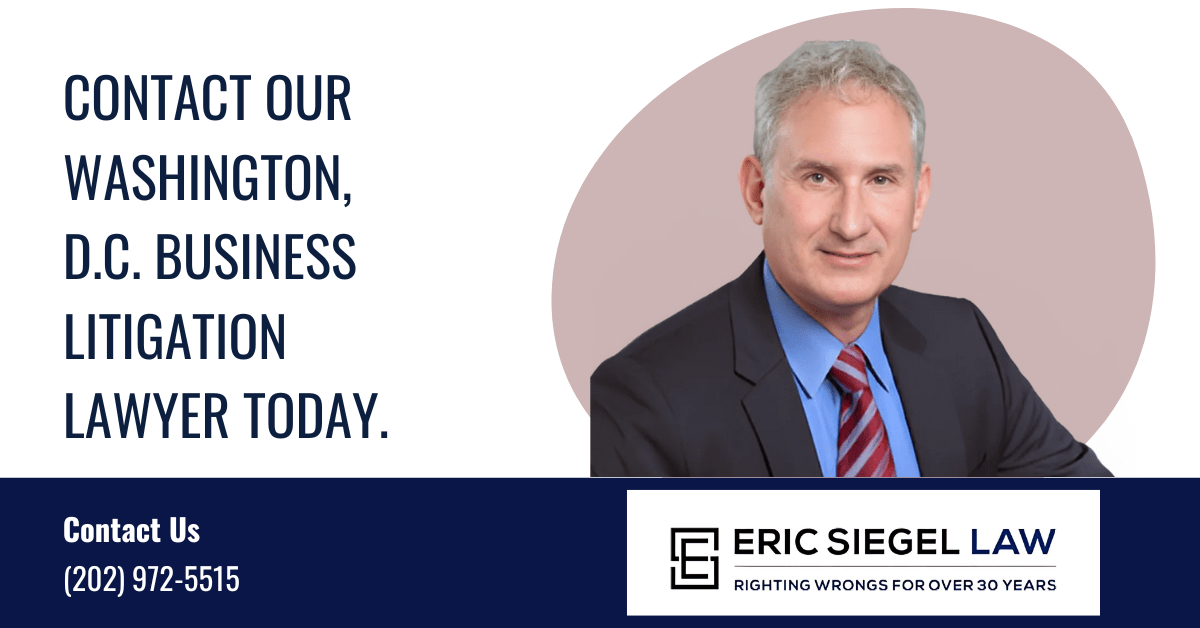
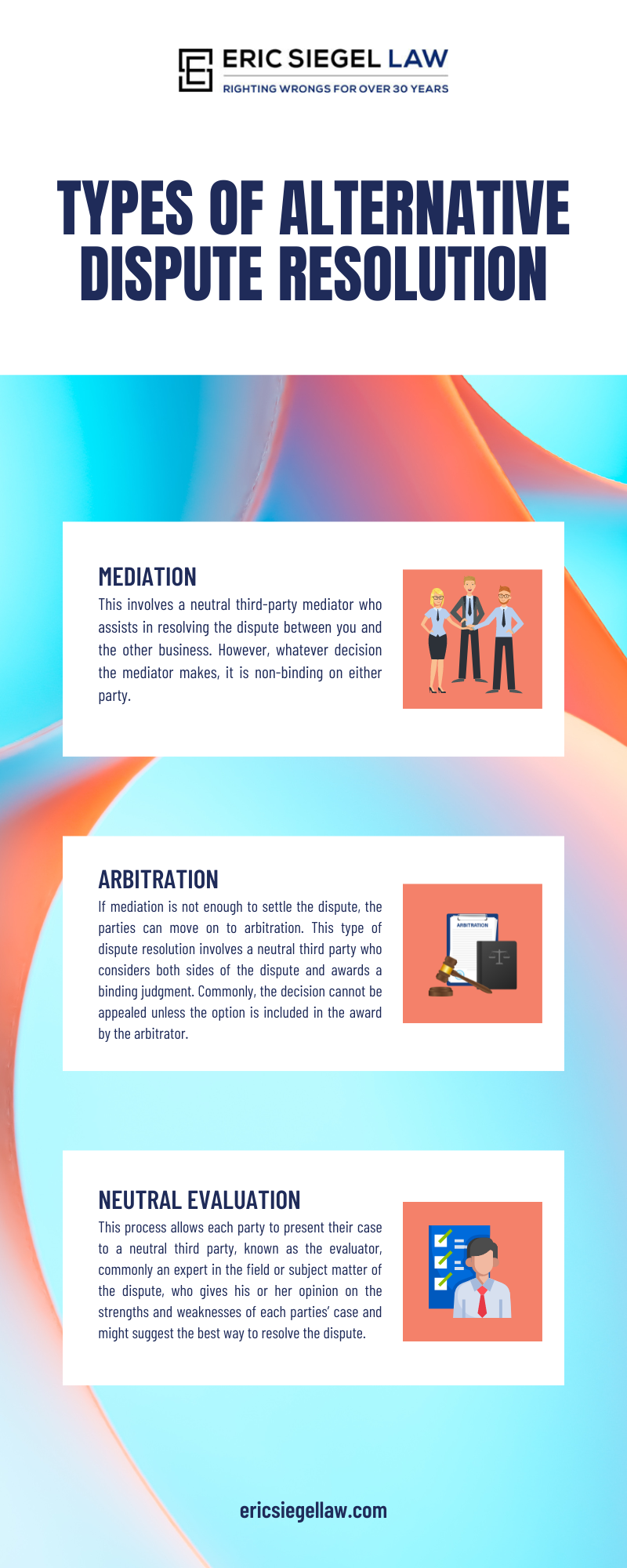
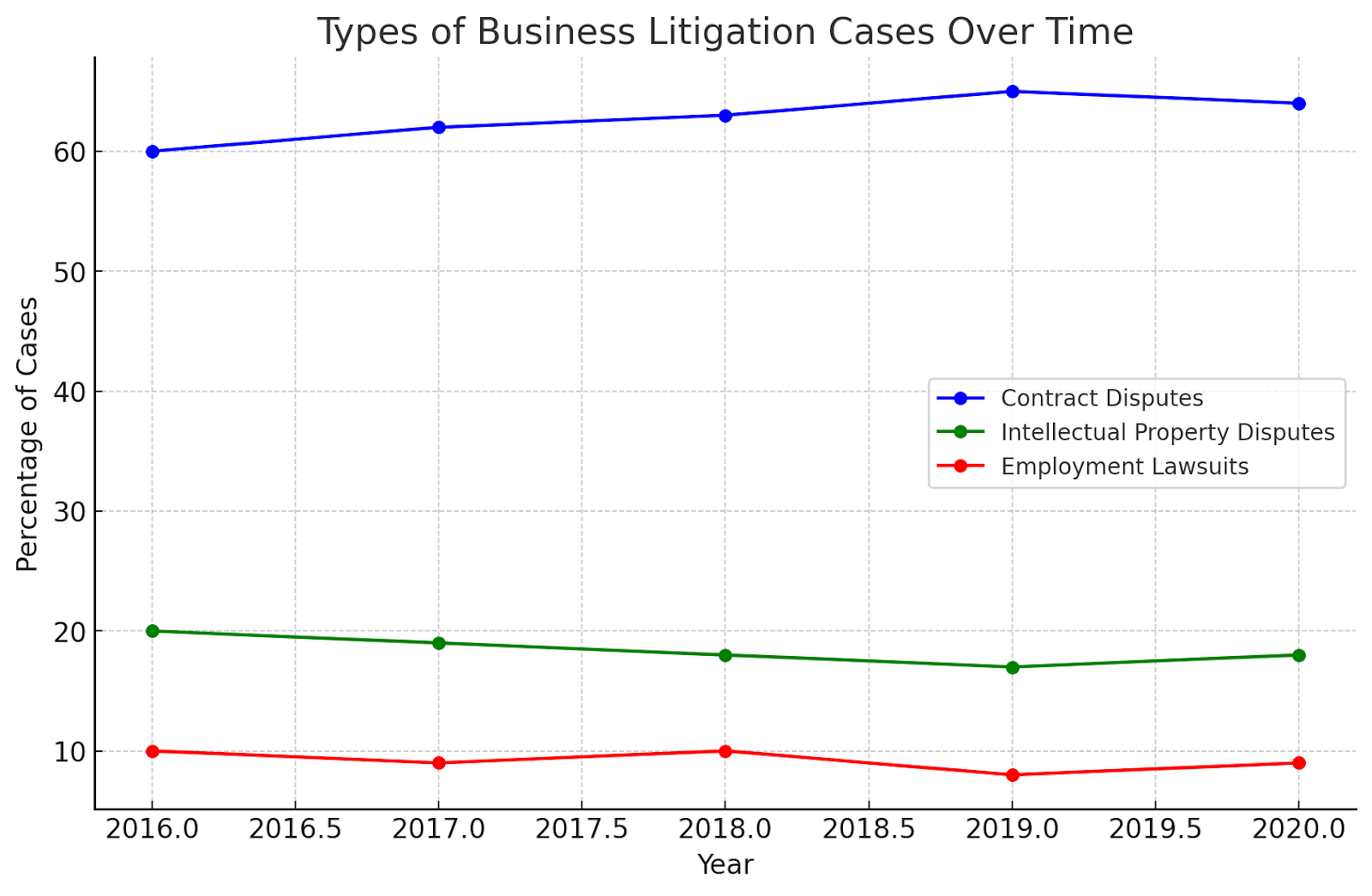
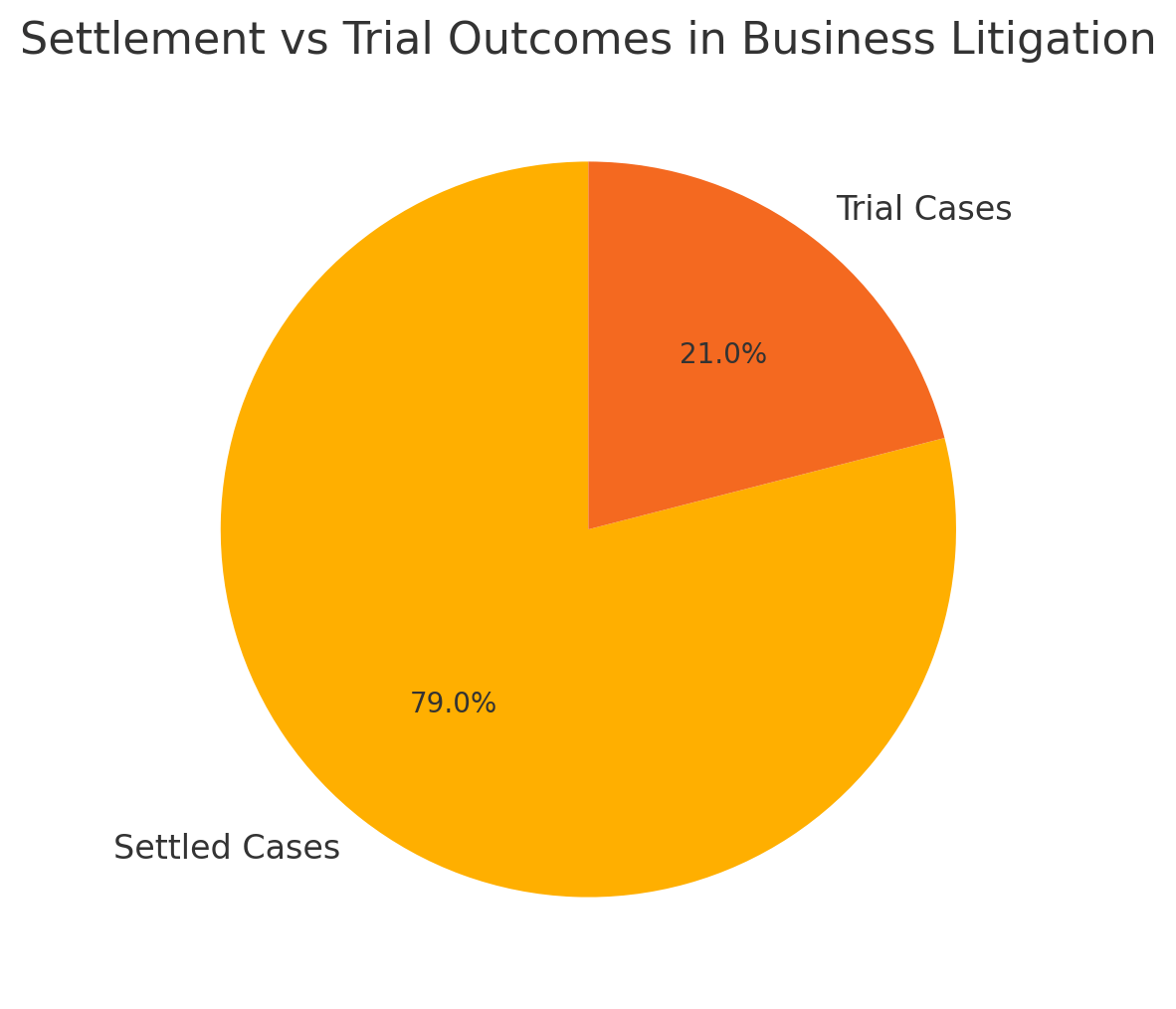
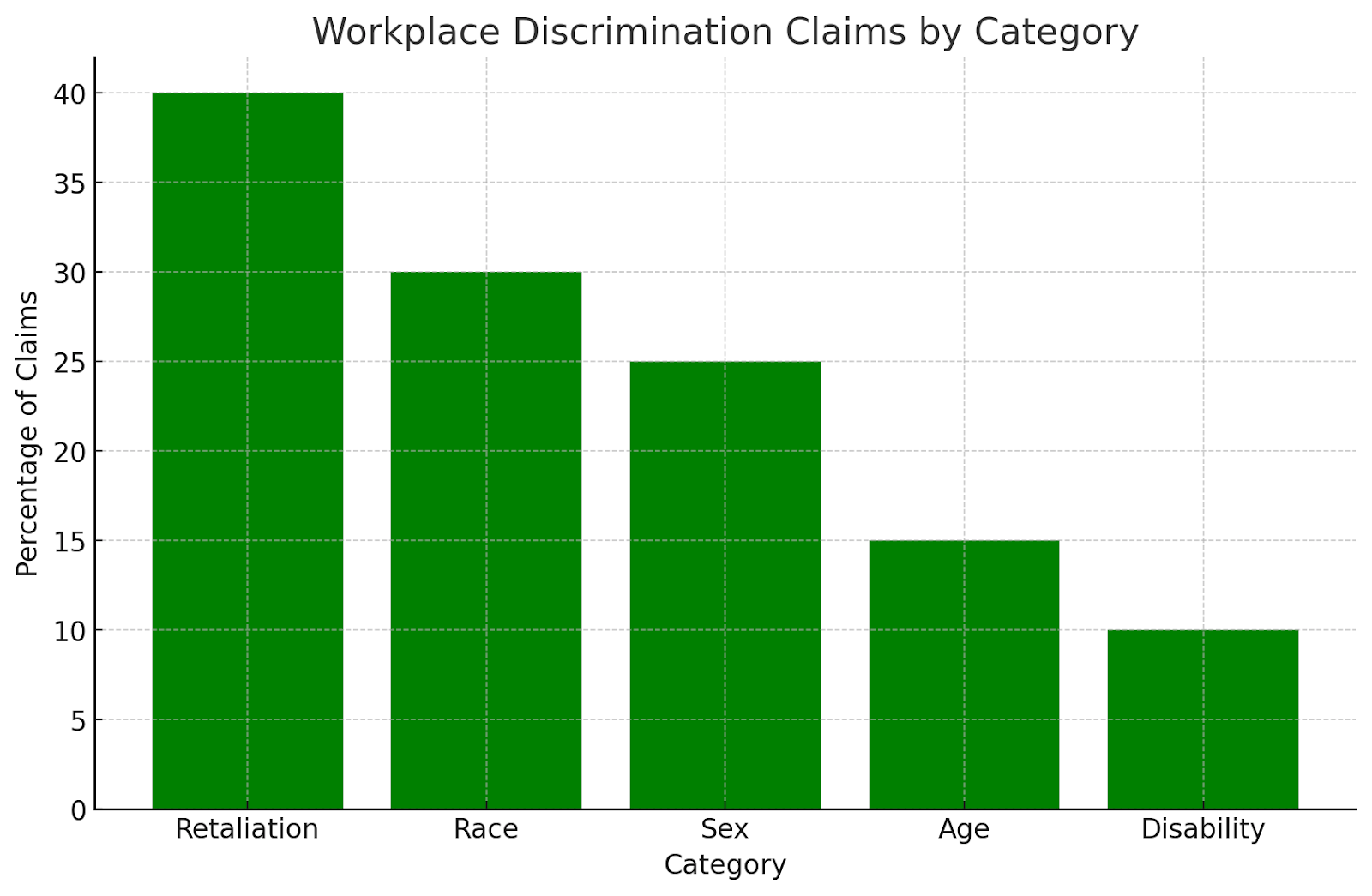 Washington Business Litigation FAQs
Washington Business Litigation FAQs

